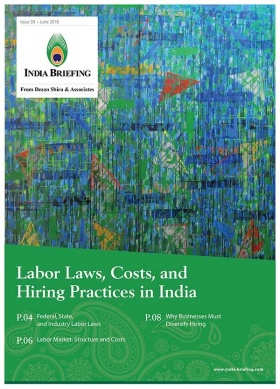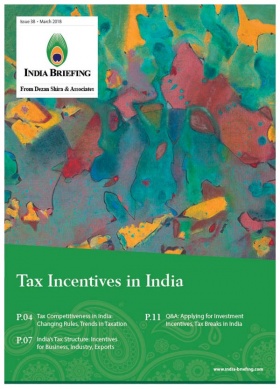Fixed-Term Employment: Now Open to All Employers in India
On March 16, 2018, India’s federal labor department official announced an amendment to the Industrial Employment (Standing Orders) Central Rules, 1946 to formalize fixed-term employment.
The amended Rules allows all types of firms in India to hire workers for a specific time period in all industries, depending on their requirements. Previously, this option was only available to employers in the apparel manufacturing sector.
The law improves working conditions for short-term employees and offers flexibility in hiring for employers, which in turn formalizes human resource (HR) practices in the country. Further, it is hoped that the move will reflect unemployment rates in India more accurately by bringing in more employees in the unorganized sector under the ambit of a formal legal arrangement.
This is important as the unorganized sector accounts for more than 80 percent of India’s economy, and is often under-regulated. Daily wage and contract workers in this sector are often deprived of decent and secure working conditions due to being outside regulatory purview.
To redress these long-standing grievances and the exploitation of temporary labor, the federal government proposed extending the fixed-term labor provision to all sectors in the 2018 Union Budget.
What is fixed-term employment?
The category of fixed-term employees is an addition to the previous categories of workers stated in the Industrial Employment (Standing Orders) Central Rules. They provide the framework for implementing the Industrial Employment (Standing Orders) Act, which can be found here.
The Central Rules regulate a company’s employment policies for: permanent or temporary workers, apprentices, probationers, or ‘badli’ workers (temporary worker employed in place of an absent permanent worker).
The rules provide details relating to the classification of workers, periods and hours of work, holidays, paydays, wage rates, and other conditions of employment.
These have to further be in line with all other federal (central) laws in India, such as The Minimum Wage Act of 1948 and state legislation, such as the Maharashtra Shops and Establishments Rules, 2018.
If the number of employees in a company exceeds 100 (this number may differ state-wise), the company may establish their own policies while complying with federal employment and labor rules. This is done through a tripartite agreement (standing order) between the government representative (state labor commission), the employees (labor unions), and the employer (company). The certification of these standing orders is only applicable once all three parties are satisfied.
Impact on India’s hiring practices
Seasonality and variation in demand patterns are a cause of concern for most companies in India. Legalizing fixed-term employment thus offers clear scope for flexibility in hiring practices for firms, whereby they can match the number of workers with the actual requirement. Companies can cut costs during lean seasons by employing workers on fixed-term contracts.
Previously, companies would use external contractors to employ short-term labor. Now, they will be able to hire directly from the market, reducing intermediary costs and, more importantly, creating transparency in the employment process. In addition, employers will not be required to pay in lieu of termination for non-renewal of the contract or expiry of the term of employment.
The law is also a positive for employees – it enables workers to be in control of their employment terms and obligations, under regulated conditions.
Formalized fixed-term hires will also ease short-term unemployment in the country. It bears noting that permanent employees will remain protected as the amendment prohibits companies from converting their permanent employees to fixed-term contracts.
Other key features of the reform are:
- Fixed-term workers must receive benefits such as the minimum wage, provident fund contributions, and other statutory benefits and allowances.
- These are required to be at par with permanent employees and paid on a proportional (pro-rata) basis, depending on the length of employment.
Labor law compliance in India
Foreign companies, especially those invested in labor-intensive industries, such as the manufacturing of goods, should take particular note of this labor reform.
Organizations planning to expand into India may keep in mind the following best practices for managing their human resources:
- Stay updated with laws and amendments – these are expected to change further in 2018-2019 as the federal government aims to organize multiple labor laws into four main legal codes.
- HR policies should be updated frequently in line with changes to the law.
- Employees must be updated whenever any changes are introduced in the labor law to avoid confusion, strikes, or be exposed to legal challenges.
- Periodic HR newsletters introducing and explaining any pertinent company policy changes.
- New recruits should be briefed comprehensively on company HR rules, hiring practices, and policies to ensure transparency in the communication between management and personnel.
- Formal procedures for communication with labor unions or workmen representatives should be in place.
- Legality of all clauses in contracts with employees should be ensured.
Formalizing labor in India, improving working conditions
The change in the Industrial Employment (Standing Orders) Central Rules comes at a time when the Bharatiya Janata Party (BJP)-led federal government is facing criticism for failing to create enough jobs and improve working conditions, as promised in their 2014 election manifesto.
As India approaches another general election year (in 2019), labor reforms are viewed as a priority to bring down unemployment rates. Whether or not these reforms will improve the ground realities of employment conditions in India remains uncertain.
National labor unions oppose the fixed-term amendment, criticizing the government’s arbitrary decision to push through reforms without discussion. Unions fear that the job security of permanent employees could be at risk due to improper execution of the law.
The BJP government instead insists that these amendments will improve the ease of doing business in India and will incentivize greater foreign investment. Further, it will provide both employers and employees the tools to cope with the complexities of the changing business environment, allowing job seekers to tap into short-term opportunities with greater confidence.
Employment law practitioner Tushar Chowdhary, Kochhar & Co., explains how the latest labor law amendment is a positive development for India.
He says, “while the reforms are primarily employer friendly, they also extend statutory benefits to fixed-term employees (on a pro-rata basis) when these were previously only offered to permanent employees. Employers can now hire any number of employees based on the duration of the project or for any temporary assignment, and irrespective of the industrial sector, under a fixed-term contract, without fear of legal repercussions. Fixed-term employees will also not be entitled to any retrenchment compensation or notice period, other than that provided in the contract”.
On the nature of labor law compliance in India, Chowdhary puts in a word of caution for foreign investors. He explains, “businesses in India have to comply with a wide variety of labor legislation dealing with wages, health safety and welfare, social security, and employee disputes. While doing business in India, foreign firms must consider the nature of their industry, territory in which the industry is located, and number of employees employed in the industry to ensure full compliance with labor laws”.
About Us
India Briefing is produced by Dezan Shira & Associates. The firm assists foreign investors throughout Asia and maintains offices in China, Hong Kong, Indonesia, Singapore, Vietnam, and Russia.
Please contact india@dezshira.com or visit our website at www.dezshira.com.
- Previous Article e-Commerce in India: Market Trends and Regulations
- Next Article Data Centers in India: Growing Digitization Creates Opportunity for Investment














